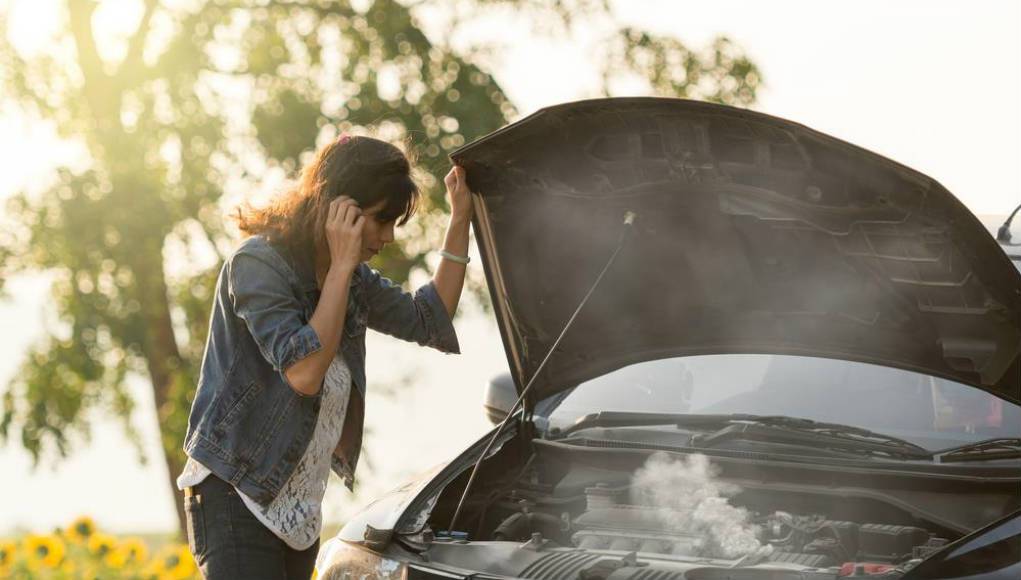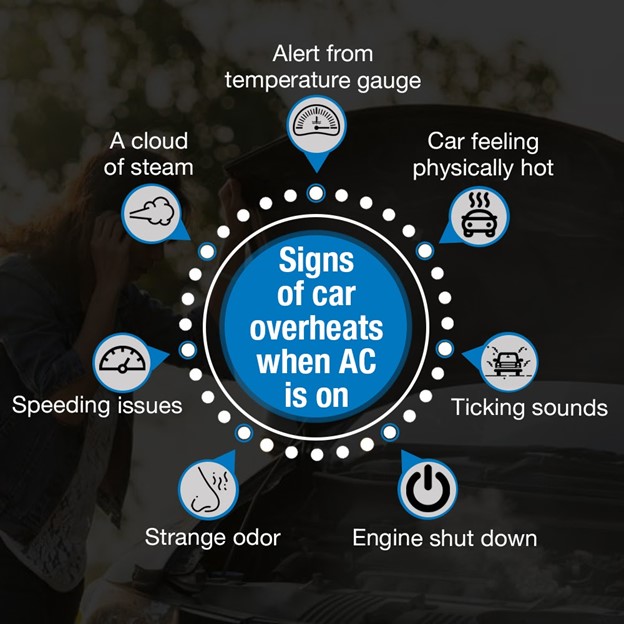A car overheats when the AC is on because the AC system increases the engine’s workload and creates additional heat. When the AC is turned on in a car, the AC system requires energy from the engine to function.
This puts an additional load on the engine, causing it to work harder and generate more heat. If the cooling system of the car is not functioning properly or there is a lack of coolant, the engine may struggle to dissipate the heat efficiently, leading to overheating.
Regular maintenance, such as checking coolant levels and ensuring the cooling system is in good condition, can help prevent this issue.
Coolant Leaks
When the AC is on, it is not uncommon for a car to overheat due to various reasons. One of the most common causes is coolant leaks. Damaged hoses or connections can lead to the loss of coolant, which prevents the engine from staying cool. Another culprit could be a faulty radiator cap, which fails to maintain the proper pressure in the cooling system. Finally, a leaking water pump can result in insufficient coolant circulation, causing the temperature to rise.
Malfunctioning Thermostat
A malfunctioning thermostat can cause your car to overheat when the AC is on. One possible issue is when the thermostat gets stuck closed, preventing the flow of coolant through the engine. This causes the engine to quickly heat up, resulting in overheating. On the other hand, if the thermostat gets stuck open, it allows coolant to constantly flow through the engine, resulting in the engine remaining cooler than necessary. This can also cause overheating since the coolant is not cycling properly. Another scenario is when the thermostat behaves erratically by opening and closing inconsistently. This leads to inconsistent cooling and can result in overheating as well.
Insufficient Cooling System Capacity
There are several reasons why your car may overheat when the AC is on. One possible cause is low coolant levels. If there isn’t enough coolant in the system, it can’t properly regulate the engine’s temperature. Another potential issue is a blocked radiator. Over time, debris and dirt can accumulate in the radiator, preventing proper airflow. This can lead to overheating when the AC is on. Additionally, an inadequate airflow due to a faulty fan or a clogged air conditioning filter can contribute to the problem.
Regularly checking your coolant levels and flushing the radiator can help prevent these issues. It’s also essential to maintain a clean air conditioning filter and ensure that the cooling fan is functioning correctly. By addressing these potential causes, you can help prevent your car from overheating when the AC is on.

Credit: carfromjapan.com
Engine Damage
When the AC is on, your car may overheat due to engine damage. One common cause is piston damage. The piston is responsible for compressing the air and fuel mixture in the combustion chamber. If it gets damaged, it can lead to inefficient combustion and increased friction, causing the engine to overheat.
Another possible cause is cylinder head damage. The cylinder head houses the valves, spark plugs, and fuel injectors. If it becomes damaged or worn out, it can affect the engine’s cooling system, leading to overheating.
Finally, a warped or cracked engine block can also result in overheating. The engine block is the main structure that houses the cylinders and other engine components. Any damage to it can cause coolant leaks or disrupt the flow of coolant, leading to overheating when the AC is running.
If your car is experiencing overheating issues when the AC is on, it’s important to have it inspected by a professional mechanic. They can diagnose the exact cause of the problem and recommend the necessary repairs to fix the engine damage and prevent further overheating.
Ac System Damage
Car overheating when the AC is on can be caused by AC system damage. This issue can be attributed to a faulty compressor, radiator fan malfunction, or low refrigerant levels, among other factors. Prompt professional attention is recommended to avoid further damage.
One common issue that can cause a car to overheat when the AC is on is compressor failure. The compressor is a vital component of the AC system as it compresses and circulates the refrigerant. If the compressor fails, it can lead to inadequate cooling and cause the engine to overheat.
Another potential cause of overheating is condenser damage. The condenser helps in dissipating heat from the refrigerant. If it gets damaged due to debris or leaks, it might hinder the cooling process and result in overheating.
Evaporator malfunctions can also contribute to the overheating problem. The evaporator cools down the air that is blown into the cabin. If the evaporator is not functioning properly, it can result in reduced cooling and increased strain on the engine, leading to overheating.
Electrical System Issues
Electrical system issues can cause your car to overheat when the AC is on. One common problem is overheated wiring, which can occur due to a variety of factors. Over time, the heat generated by the current flowing through the wires can cause them to become damaged and worn, resulting in resistance and increased temperature. This can lead to a buildup of heat in the surrounding areas, including the engine compartment.
Another issue that may cause your car to overheat is fuse blowouts. Fuses are designed to protect the electrical components in your vehicle by breaking the circuit when there is a power surge. However, if the fuse repeatedly blows out, it could indicate an underlying electrical problem that needs to be addressed.
Furthermore, overheated wiring and fuse blowouts can pose potential fire hazards. If the electrical system becomes too hot and is not properly managed, it can lead to electrical fires, which can be dangerous for both you and your vehicle.
Regular Coolant Checks
When the AC is on in your car, it puts an extra load on the engine, causing it to work harder and generate more heat. This can lead to overheating if your cooling system is not properly maintained. Regular coolant checks are crucial to prevent overheating.
Monitoring coolant levels is an essential part of car maintenance. Low coolant levels can result in poor heat transfer, leading to overheating. It’s important to check the coolant reservoir regularly and top it up if necessary. Additionally, inspecting for coolant leaks is vital. Leaks can cause a loss of coolant, resulting in overheating. Check for any visible signs of leakage, such as puddles under the car or a sweet smell in the engine compartment.
Another crucial aspect of regular coolant checks is replacing the coolant as needed. Over time, coolant deteriorates, loses its effectiveness, and becomes less capable of regulating the engine temperature. It’s recommended to flush and replace the coolant according to your car manufacturer’s guidelines.
By paying attention to regular coolant checks, monitoring coolant levels, inspecting for leaks, and replacing coolant as needed, you can prevent your car from overheating when the AC is on, ensuring a smooth and comfortable driving experience.
Thermostat Maintenance
If your car overheats when the AC is on, it’s crucial to ensure that your thermostat is functioning properly. Checking the thermostat operation should be a routine part of your car maintenance. The thermostat plays a key role in regulating the engine’s temperature, so any malfunction can lead to overheating.
To check the thermostat operation, start by checking the temperature gauge on your dashboard. If the gauge indicates that your engine is overheating, it’s a sign that the thermostat may not be opening properly. Another way to test the thermostat is by feeling the upper radiator hose after your car has warmed up. If the hose feels cool or lukewarm, the thermostat might be stuck closed.
If your thermostat is not functioning as it should, it’s important to replace it promptly to prevent further damage to your engine. Consult your car’s manual or seek professional help to replace the thermostat correctly.
Cooling System Maintenance
When the air conditioning (AC) is on in your car, it can cause the engine to overheat if the cooling system is not properly maintained. One important aspect of cooling system maintenance is to clean the radiator and condenser regularly. These components can accumulate dirt, dust, and other debris over time, which can restrict airflow and hinder the cooling process. By cleaning the radiator and condenser, you can remove any obstructions and ensure optimal heat dissipation.
Another crucial step in cooling system maintenance is to remove debris from the air filters. Dirty or clogged air filters can impede airflow to the engine, causing it to work harder and generate more heat. By regularly cleaning or replacing the air filters, you can prevent overheating issues.
Additionally, it is essential to ensure proper fan function. The fan plays a vital role in cooling the radiator by pulling air through it. If the fan is not functioning correctly, it may not provide sufficient airflow, leading to overheating. Regularly inspect the fan and make necessary repairs or replacements if needed.
Ac System Maintenance
Regular maintenance and cleaning of your car’s AC system is essential to prevent overheating when the AC is on. It is important to inspect and replace any damaged or worn-out AC components to ensure the smooth functioning of the system.
Maintaining the refrigerant levels is also crucial as low levels can put extra strain on the AC compressor, leading to overheating. Regularly checking and topping up the refrigerant will help in maintaining optimal performance.
| AC System Maintenance |
| Regular servicing and cleaning |
| Inspect and replace AC components |
| Maintain refrigerant levels |
Conclusion
Addressing an overheating car when the AC is on requires understanding the root causes. Checking coolant levels, examining the radiator, and inspecting the cooling fan and thermostat can help identify problems. Regular maintenance and servicing can help prevent overheating issues in the future.
By being proactive and addressing any issues promptly, you can ensure a smooth and cool ride with your AC on.

